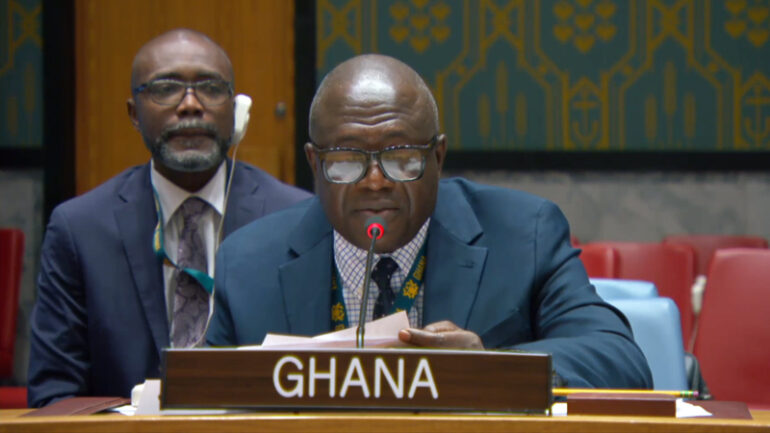UNSC Briefing on the contribution of the United Nations Police to the new Agenda for Peace

John Osei
Assistant Commissioner of Police
Police Advisor
Permanent Mission of Ghana
New York, November 14, 2023
Mr. President,
Let me begin by thanking USG Jean-Pierre Lacroix; Mr. Christophe Bizimungu, Police Commander/MINUSCA; Ms. Christine Fossen, Police Commissioner/UNMISS; Mr. Faisal Shahkar, UN Police Advisor; and Ms. Karin Langren, Executive Director of the Security Council Report for their insightful briefings on different aspects of UN policing. Over the years, the United Nations has demonstrated its capacity for maintaining social order in fragile and conflict contexts through the provision of effective, efficient and accountable policing across the different UN Peacekeeping Missions. On this occasion, we deem it appropriate to pay tribute to all UN peacekeepers, especially the police personnel, for their commitment and continuing efforts, and for those that have paid the ultimate sacrifice in the line of duty, we pray for the continued peaceful repose of their souls and for their sacrifice not be in vain.
Mr. President,
Since Ghana first deployed police personnel for international peacekeeping duties to the Congo in the 1960s, we have continued to hold firm the norms required for international policing as demonstrated throughout the peacekeeping cycle in our pre- to post-deployment practices. Apart from providing physical protection for civilians and ensuring law and order in conflict areas, our contributions have supported UN policing to restore hope to distraught and displaced civilians. It has also contributed to build confidence in fragile communities through intelligence backed surveillance, community policing, and facilitated accountability through investigation of incidents of sexual and gender based violence, human rights abuses and other serious crimes.
With 425 personnel in Formed Police Units (FPU), 32 Individual Police Officers (IPO) and 106 Staff Officers at various UN mandated missions, we recognize the importance of constructive deliberations to build consensus on measures to boost preventive diplomacy, shift the prevention and sustaining peace paradigm within countries, transform gender power dynamics in peace and security as well as strengthen peace operations and partnerships.
Mr. President,
Within the context of the Secretary-General’s New Agenda for Peace and the Action for Peacekeeping and the A4P+ initiatives allow me to make the following points which are germane to the work of UNPOL and directly has the potential to contribute to the realization of the Secretary-General’s New Agenda for Peace:
Firstly, amid the growing challenges with UN peace operations, we urge a key role for UN policing within peace operations to rebuild trust and solidarity with communities in ways that can strengthen the social contract of citizens with their governance institutions and leaders, protect and empower citizens, and foster trust within distrustful societies. As we have noted before, UN policing has a demonstrative effect, especially on host communities and working with host States and local communities, we must leverage this unique advantage to undermine some of the
grievances that violent extremist groups and terrorists have used to prey on many fragile communities. Ghana would encourage the sustained engagement of the Department of Peace Operations and field missions in this regard.
Secondly, Ghana supports stronger national ownership of preventive measures and stresses the responsibility of Member States to sustain the national peace infrastructure in a professional way and to work with regional organization in implementing prevention strategies. In this regard, we hold that even as peace operations may impose tailor-made solutions to address the drivers of instability in host States, a strong push should always be made to implement bottom-up approaches that draws out community and national ownership for the investments in peace and which also interlock with regional early warning and conflict prevention mechanisms that can sustainable support peace efforts.
Thirdly, in line with Ghana’s firm belief in inclusivity and gender mainstreaming, we call for increased participation of women in peace support operations, including in mediation processes. It is regrettable that many of those affected by conflict and violence continue to remain on the sidelines of decision making, especially women and young people. We underscore the mutually reinforcing impact and the need for the Women, Peace and Security agenda to be deepened in United Nations policing and peacekeeping in general.
We note the efforts of UNPOL and the Department of Operational Support to ensure full, equal and meaningful participation of women in all stages of the peace process and by systematically integrating a gender perspective into all stages of analysis, planning, implementation and reporting. On our part, the Ghana Police Service in its transformation agenda has taken very seriously gender-related issues as part of its institutional restructuring to reflect contemporary national demands and international practices and also to help improve the quality of its policing practices within UN Missions.
Mr. President,
In conclusion, we encourage the further deployment of innovative and technological solutions to address the challenges of peacekeeping and support the performance of UN policing within the mandates of UN peace operations. We also underscore the importance of ensuring adequate financing and resourcing of all mandated UN Peacekeeping Operations to enable them to fulfil their responsibilities, and to support peacebuilding activities throughout the life cycle of peacekeeping operations, especially during transitions.
I thank you
